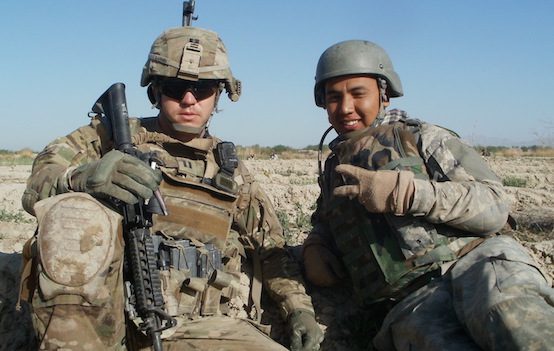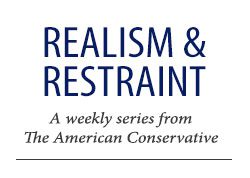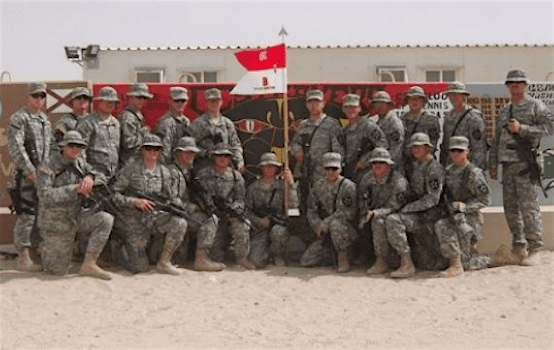Yes, My Fellow Soldiers Died in Vain

Sergeant Alex Fuller hailed from the depressed coastal town of New Bedford, Massachusetts. His brothers and sister did stints in prison; he sold drugs himself as a teen, and barely earned a GED.
Then he found a home in the army. He excelled, he loved it, and even made sergeant in record time. Most of all he was my friend. His story didn’t end well, of course. On January 25, 2007 his body was shattered by a massive improvised explosive device (IED) in East Baghdad, Iraq. He was 21. His 19-year-old wife was pregnant. His family buried him on Cape Cod. Such is life.
We’re expected to honor such sacrifice each Memorial Day. At least that’s what tradition holds. But how best to do that? These days, most Americans, and especially their political leaders choose the vapid, simplistic path: “thanking” soldiers, flying flags, sticking yellow ribbons on car bumpers. There’s nothing inherently wrong with all this, of course, but let’s not pretend it helps anything. Stacy Fuller named Al’s daughter after him. My oldest son’s name is Alex. Many of us honor him with our memories, recollections, thoughts, and symbols such as memorial bracelets. But it’s not enough. It’s far from sufficient.
This Memorial Day, spare us the flyover jets, flag-wielding honor guards, and other patriotic mush of 21st-century popular culture. Instead, I’d submit that now—after 18 years of endless, ineffective war—it’s a time for nuance, for a collective national self-assessment. What was it all for, Alex’s death and those of more than 7,000 others in uniform? Very little, it seems.
Al died fighting Shia militiamen, who had nothing to do with 9/11, in a Baghdad ghetto. These largely impoverished and unemployed fighters only attacked my platoon because it was there, occupying their cities and inflaming nationalistic resentments. He died in a country that the United States only invaded as a result of lies, deceit, and intelligence mistakes. Al and the rest of us generally tried hard and mostly meant well, but in retrospect we brought not democracy and stability to Iraq, but chaos and civil war.
Hundreds of thousands died, millions were displaced, and a once secular society became a theater for macabre sectarian murder. He died in a country that his commander-in-chief, George W. Bush, didn’t even understand. Most importantly, he and we did not, ultimately leave the place better than we found it. The Shia chauvinists the United States empowered only alienated the Sunnis, heightened Kurdish desires for autonomy, and led to the rise (in our prisons) of the Islamic State. Through it all our military is still there.
Specialist James Smith was Texan to the core. He grew up just outside of Dallas, an all-American boy who played sports and raised hell throughout high school. Soon after, he enthusiastically joined the army, seeking the adventure of combat and the camaraderie of military life. Soon enough he became my Humvee driver.
A legitimate adrenaline junkie with an almost absurd level of personal courage, James constantly forced me to reign him in. “Get back in the fucking truck!” I’d yell in the midst of a firefight. “You’re job is to drive, Smith!” He’d dutifully comply, only to pull the same stunt the very next day. He, too, was my friend. His story didn’t end well either. In June 2007, while home on leave from the war, James took his own life. He was newly married. We’ll never know exactly why he did it, but odds are it had something to do with the friends who he’d witnessed die those last months.
I remember the captains and colonels who passive aggressively questioned why I, his lieutenant, hadn’t seen Smith’s suicide coming. God, I hated them for that! The whole obtuse display of shock at the suicide—there would be a few more within the squadron over the years—demonstrated just how disjointed senior leaders and politicians can be on the ramifications of sustained military trauma. At present, 22 veterans commit suicide each day. Nothing seems capable of improving this national disgrace, but I bet ending useless forever warfare might help.

2nd platoon, B Troop, 3rd Squadron, 61st Cavalry, “The Ghostriders,” Kuwait, October 2006. (Danny Sjursen)
Through it all, the sacrifice, the waste, America remains at war. In fact, President Donald Trump even threatens an ill-advised, irrational, and immoral war with Iran. In a frightening case of national deja vu, I’m certain I’ve seen this film before. It doesn’t end well. It never does.
Count me sick of the prevailing platitude: “He died for his brothers-in-arms!” In a sense, it’s true enough, but the trope is mainly obtuse and paltry. Inherent in the sentiment is the implication that soldiers never die in vain, no matter the war. I, for one, don’t think that’s true. Sure when the bombs blow and the bullets crack, king and country matter very little. Still it was politics, and nation, that landed the soldier in whatever distant locale he finds himself. And there better be a damn good reason to be there, for troopers like mine and so many others, to lose their lives. Forgive me, but I think we owe them that much!
Do me a favor this year: question the foundation and purpose of America’s wars for the Greater Middle East. Weigh the tangible costs in blood and treasure against any benefits to the nation or the world—if there are any! Ask how this country’s political system morphed in such a way that Congress no longer declares, and presidents turned emperors unilaterally wage endless wars in distant locales. Ask yourself how much of this combat and death is connected—if at all—to the 9/11 attacks; why the over-adulated U.S. military mainly fights groups that didn’t even exist in 2001.
For God’s sake, think! Be a citizen. Honor your soldiers. Don’t waste their lives any longer.
Danny Sjursen is a retired U.S. Army Major and regular contributor to The American Conservative. His work has also appeared in Harper’s, the Los Angeles Times, The Nation, Tom Dispatch, The Huffington Post, Truthdig, and The Hill. He served combat tours with reconnaissance units in Iraq and Afghanistan and later taught history at his alma mater, West Point. He is the author of a memoir and critical analysis of the Iraq War, Ghostriders of Baghdad: Soldiers, Civilians, and the Myth of the Surge. He co-hosts the progressive veterans’ podcast “Fortress on a Hill.” Follow him on Twitter at @SkepticalVet.
Comments